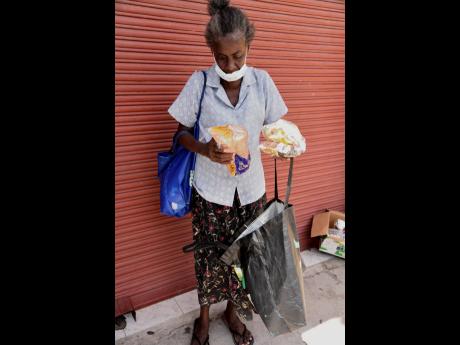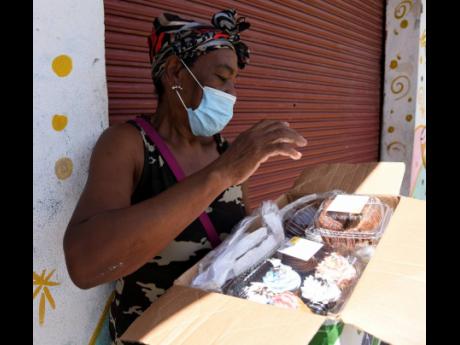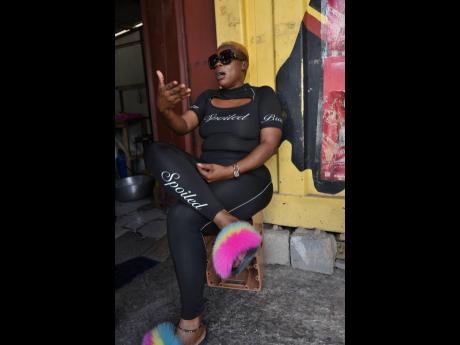COVID-19 forces inner-city women to get creative for survival
Faced with job losses and personal businesses going under as a result of the devastating impact of COVID-19, many women in Kingston’s inner- city communities are now employing innovative means to support themselves and their families.
According to the findings of a recent study done by UNICEF and the Caribbean, released by the Caribbean Policy Research Institute (CAPRI), eight in every 10 households suffered loss of income from the fallout of the global pandemic.
Last week, The Sunday Gleaner visited several inner-city communities to learn how some residents were coping.
Sophia McKenzie of Southside in Kingston, who makes a living selling clothing and other items purchased from overseas, shared that she had booked an airline ticket from March to travel to the United States to buy goods, but because of the impacts of COVID-19, she has to wait until next year to fly.
“Mi normally go foreign go buy and come home come sell, but tru COVID mi nuh hold nuh flight because mi have a ticket from March fi go up and mi nuh gone. Mi plan fi go next year but mi just a mek it blow off,” she shared.
“Mi ticket alright, because it is an open ticket. Because of the situation, the airline tell me seh it last for one year but there are no set flights.”
With her informal business practically at a standstill, McKenzie said it has been quite challenging making ends meet, but even then, she shares whatever she has with others. She is quite aware that many are feeling the pinch more than others, so she believes each person has to be a good Samaritan to help the needy. As an example, she said whenever she receives goodies from her relatives, she shares with those less fortunate.
“From COVID, things slow with plenty people. Food-wise, some of them can’t afford it. We don’t know when things going to come back. We don’t know when school going to open because by October, it (the virus) can bruk out again if dem nuh tek heed,” she said.
SHIFT UP THINGS
One woman who was testament to the hard times some are facing was Jacqueline Rodgers, who on Friday was on her way home to east Kingston from a poor relief institution in downtown Kingston, where she got a bag of bread, one raisin bread and a pack of pastry.
“I used to do a little helping out at the St Aloysius Primary School but nothing not going on. Mi always help dem do likkle something, like pack up chairs and neat up,” said Rodgers, who has no children.
“I just went to poor relief to get a few items. I don’t know how I will manage because dem seh school going to open October. I just have to hold on, so in the meantime I just want to make sure I have something to eat.”
Sixty-five-year-old Sonia Dawkins said prior to COVID-19, she operated a bar but she is now selling pastry items and using other innovative means to survive.
“Mi did affi shift up the thing from the start of the pandemic, so I started selling cake and cookies,” she said.
“Most of the people dem not working and dem cannot get to hustle because they have to go by the pandemic rules of the Government and the curfew time. Sometimes if I have it, I help out others who don’t have it and give them a plate a food.”
Lamenting on the reality that some parents won’t be able to send their children back to school if and when it reopens this year, Dawkins said, “Sometimes the parents cannot find the homeschooling money, suh is either they have to send them to school or they have to sit in the house and teach the children. Nuff of the parents not up to scratch.”
Ninth Street resident Angela Clayton, a hairdresser by profession, said she had to cut off her own hair because of the hard times and seek other means of earning a living.
“Nothing naa gwaan. Nobody naa do dem hair. If anybody even a do hair, dem do dem own hair. Dem find something to do with dem hair because they don’t have any funds,” she said.
“Mi have a likkle spouse who get a likkle work now and then and him help out when him can, naa go lie. Mi will try mi likkle thing by going out there and sell fragrances. Mi go to mi nearby people dem weh have dem business, cuz you know people waa smell good no matter what.”
Clayton added, “It’s going to be hard when school starts, but knowing me, I am a fighter and go-getter. Mi affi try mi best. Some parents have eight kids or five kids and are meeting it much harder than me. I have three children but I am only responsible for one.”
BANK ACCOUNT FOR ALL
Sustainable development professor at The University of the West Indies, Anthony Clayton, suggested that the Government should encourage Jamaicans to open bank accounts in order for the Government to channel funds to the most vulnerable, especially.
“Most people do not even have a bank account. One of the things we should have done a long time ago is bring all of the people into the banking system. If everybody had a bank account, then the Government could put a little money in the accounts of the people who are most in need, so that they can actually go out and buy the food they need,” said the professor.
“We must learn from this pandemic so that in future, we will have a way of getting a little money to the people most in need.”



